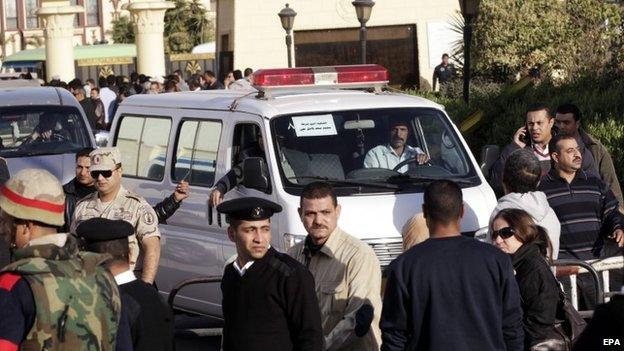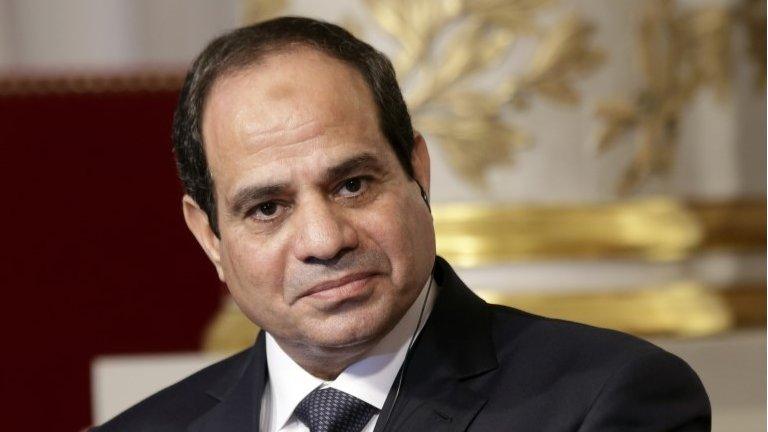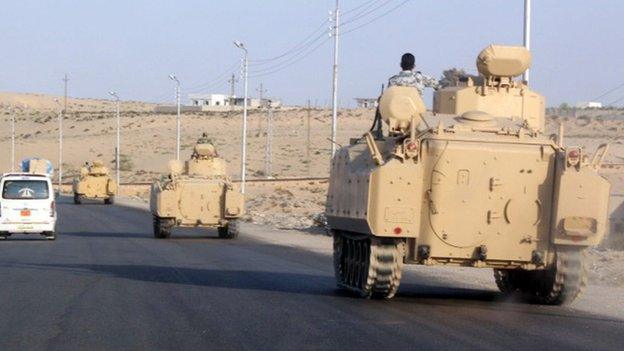Egypt media review: Outrage over Sinai attacks
- Published

Funerals begin for the victims of Thursday's attacks
Egyptians have pointed the finger of blame at both militants and the government following the deadly attacks in North Sinai that resulted in at least 29 deaths.
Local press largely followed the government line condemning the attack, with the banned Muslim Brotherhood (MB) passing on its condolences to the families of the dead.
Meanwhile, some prominent social media users condemned the government for the attack, with one calling for Egypt's president to step down.
'Malicious attack'
Egyptian state-owned TV reflected the state of uncertainty and confusion after the attacks, leaving the number of victims at "dozens" and quoting statements by the country's military.
Egyptian TV and press backed the armed forces, describing events as a "malicious terrorist attack" and publishing comment by political parties and prominent figures.
State-owned Al-Ahram, external quoted the leftist Al Wafd party as saying "the blood of our martyrs in Sinai will only strengthen our will to fight terrorism".
The privately owned Al-Shuruk, external quoted former UN Secretary-General Boutros-Boutros Ghali as saying: "Egypt is in war with international terrorism which needs all Egyptians to stand behind their leadership and its army and security forces." Mr Ghali also called for the international community to support Egypt.
Social media users urged a response to the violence. "The country is a state of terrorism and anyone who attacks the army... or even anyone who is OK with what happened or is justifying it is a traitor and does not deserve to live," one Egyptian Twitter user wrote.
The Arabic hashtags #Sinai and #AlArish, and the key words "martyrs of nation", trended on Twitter in the wake of the incidents. #Sinai was used around 20,000 times, with many criticising the government and blaming it for the repetition of such incidents.
"Egypt is too big to be ruled by a corrupt man like Mubarak, a traitor like Morsi or a loser like Sisi," prominent journalist Yasir al-Zaia wrote.
Egyptian actor and film director Khalid Abul-Naja, who has over a million followers, wrote in Arabic: "I cannot see an end for this dark tunnel of black terrorism from one side and only security solutions from the other... If Al-Sisi wants to stop the bloodshed he should step down from power immediately."
His tweet was re-posted hundreds of times.
'A new phase'
The MB said it "unequivocally" condemned "all acts of violence" on its Twitter account.
"Our deepest condolences to the families of the deceased soldiers in Sinai and the Egyptian people," it said.
Despite this official stance, some comments on social media linked the Sinai attack to a statement issued by the MB on 27 January, in which the group called its supporters to "get ready for Jihad".
"Everyone should understand that we are about to start a new phase, in which we are mobilising all our powers and recalling the meanings of Jihad," the statement said.
"We are getting ready ourselves along with our wives, sons, daughters and everyone who follows our steps for a long path of relentless Jihad, in which we aim for the honourable status of martyrs."
There is no evidence of a direct link between the MB and the Sinai Province group (formerly known as Ansar Beit al-Maqdis) that claimed responsibility for the attack.
Sinai Province claimed responsibility for the attacks through its official Twitter account.
BBC Monitoring, external reports and analyses news from TV, radio, web and print media around the world. You can follow BBC Monitoring on Twitter , externaland Facebook, external.
- Published30 January 2015

- Published30 January 2015
